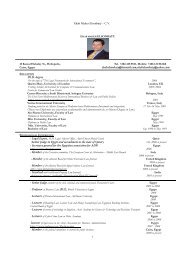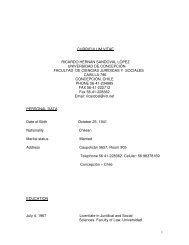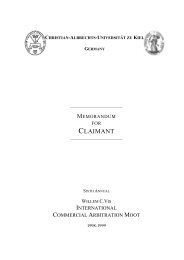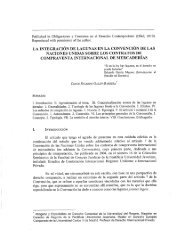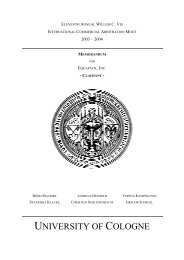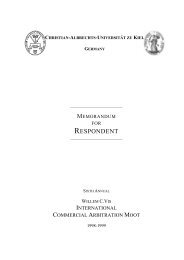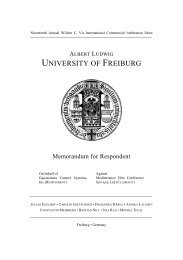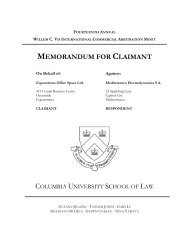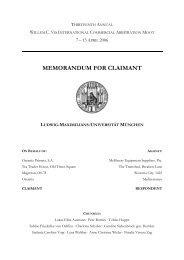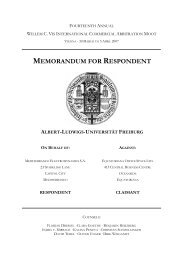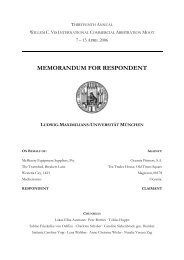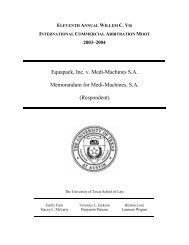MEMORANDUM FOR RESPONDENT - Pace University
MEMORANDUM FOR RESPONDENT - Pace University
MEMORANDUM FOR RESPONDENT - Pace University
Create successful ePaper yourself
Turn your PDF publications into a flip-book with our unique Google optimized e-Paper software.
QUEEN’S UNIVERSITY FACULTY OF LAW<br />
Perishable and seasonal goods compel the noble month to be reduced [Andersen VI.2]. In a case<br />
concerning the sale of live fish, a German Court of Appeal considered the noble month, but<br />
nonetheless found the circumstances required a reasonable time period of eight days [OLG May<br />
1998]. Similarly, here the noble month should be reduced. Since Claimant’s notice took 28 days,<br />
it was barely within a month, and when the noble month is adjusted downward in accordance<br />
with the circumstances, Claimant’s notice was late. By failing to provide notice within a<br />
reasonable time, Claimant has lost its right to rely on the non-conformity.<br />
II. <strong>RESPONDENT</strong> IS NOT PREVENTED FROM RELYING ON ART. 39 CISG BY VIRTUE OF ART.<br />
40 CISG.<br />
106. Claimant argues that Respondent was not entitled to reasonable notice by operation of art. 40<br />
CISG [Cl. Memo. 74]. This argument must fail. Art. 40 CISG prevents a seller from relying on<br />
arts. 38 and 39 CISG if it “knew or could not have been unaware” of facts related to the non-<br />
conformity, but did not disclose them. Claimant has the burden of proving Respondent “knew<br />
or could not have been unaware” [Schwenzer in Schlechtriem/Schwenzer 2010 647]. Here, Claimant<br />
cannot prove Respondent possessed the awareness required for art. 40 CISG [A]. In the<br />
alternative, Respondent disclosed the risk of non-conformity to Claimant [B].<br />
A. Claimant cannot prove Respondent was aware of the facts related to the nonconformity,<br />
so art. 40 CISG does not apply.<br />
107. Respondent was not aware of the facts related to the non-conformity. Art. 40 CISG requires the<br />
seller to have displayed an “obvious” knowledge of the facts related to the non-conformity<br />
[Schwenzer in Schlechtriem/Schwenzer 2010 644]. A German Court of Appeal held that the seller<br />
must have knowledge akin to bad faith or fraud for the provision to apply [OLG Feb 2004].<br />
Another arbitral tribunal held that the seller’s awareness must “amount to at least a conscious<br />
disregard” of the facts related to the non-conformity [Beijing Light v. Connell (Sweden 1998)].<br />
Claimant cannot meet this high standard.<br />
108. Claimant alleges the Squid failed to conform because it did not weigh 100-150 g. Accordingly, it<br />
must prove Respondent was aware the Squid would weigh less than 100 g. Admittedly,<br />
Respondent knew illex danubecus caught earlier in the harvesting season “tend to be small” [St. of<br />
Def. 13]. However, Respondent never weighed the Squid, nor is there any evidence Respondent<br />
knew—or ever even considered—their actual weight. Accordingly, Respondent did not<br />
“obviously” know the Squid weighed less than 100 g. Nor did Respondent hide its knowledge so<br />
as to deceive or defraud Claimant. Finally, there is no evidence that Respondent closed its mind<br />
to, or consciously disregarded, the fact that the Squid weighed less than 100 g. Ultimately,<br />
Respondent’s general awareness of the harvesting season of illex danubecus cannot rise to the<br />
32



